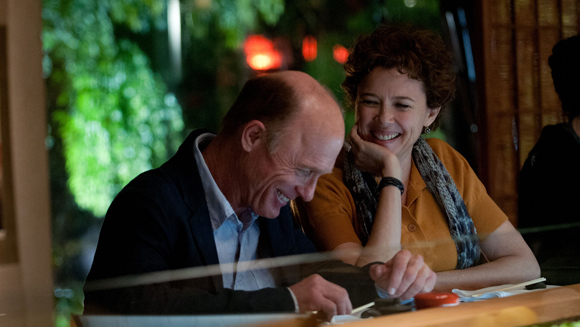Directed by Arie Posin.
Starring Annette Bening, Ed Harris, Robin Williams, Amy Brenneman, Jess Weixler and Linda Park.
Anything concerning itself with themes of romantic redemption should beware. Soderbergh navigated this minefield with aplomb during his exploration of subjective bereavement in Solaris. Something which Arie Posin attempts with The Face of Love, but without Soderbergh’s whistles and bells or deep space atmospherics.
 Having attracted a stellar cast in Ed Harris, Annette Bening and Robin Williams. Arie Posin directs with poise and self-assurance, drawing out performances of subtlety from all concerned. Williams is muted and distant throughout, offering up a poignant interpretation of a widower still at odds with his situation. Whilst Bening has more emotional meat to draw upon as Nikki. Widow to Harris’s Garrett we get moments of location specific flashbacks. Each one providing additional layers to a relationship defined by creativity and artistic freedom. For me Harris remains underrated in a career littered with memorable turns seemingly overlooked by the acting elite. Here is another example where he clearly relishes Garrett’s artistic inclinations, harking back to a notable turn as Jackson Pollock. Similarly in Bening’s subdued take there are moments of Carolyn Burnham minus the controlled hysteria. Which go some way to grounding this premise in a recognisable reality.
Having attracted a stellar cast in Ed Harris, Annette Bening and Robin Williams. Arie Posin directs with poise and self-assurance, drawing out performances of subtlety from all concerned. Williams is muted and distant throughout, offering up a poignant interpretation of a widower still at odds with his situation. Whilst Bening has more emotional meat to draw upon as Nikki. Widow to Harris’s Garrett we get moments of location specific flashbacks. Each one providing additional layers to a relationship defined by creativity and artistic freedom. For me Harris remains underrated in a career littered with memorable turns seemingly overlooked by the acting elite. Here is another example where he clearly relishes Garrett’s artistic inclinations, harking back to a notable turn as Jackson Pollock. Similarly in Bening’s subdued take there are moments of Carolyn Burnham minus the controlled hysteria. Which go some way to grounding this premise in a recognisable reality.
What is overlooked and subsequently under developed however, is the part Amy Brennaman plays as Bening’s daughter. Emotionally and geographically distant for a chunk of our running time, she represents the singular voice of reason. Existing outside the bubble Bening has created, Brennaman hammers home her point in one decisive outburst. Acting as a catalyst which opens Nikki up to the cold realisation of the situation.
Within Harris’s performance notions of self and identity are explored against the backdrop of extreme loss. While Posin uses artwork as a motif to challenge our preconceptions of everyday life. However by intellectualising rather than dramatising in his search for meaning, he strips away the ability to connect emotionally. Leaving a sense of isolation and distance in his wake. A recurring problem experienced in the past by others who chose navel gazing over commercial success.
extreme loss. While Posin uses artwork as a motif to challenge our preconceptions of everyday life. However by intellectualising rather than dramatising in his search for meaning, he strips away the ability to connect emotionally. Leaving a sense of isolation and distance in his wake. A recurring problem experienced in the past by others who chose navel gazing over commercial success.
This is why Clooney and Soderbergh did the Ocean films through Section Eight. It meant that films like Goodnight and Good Luck or Syriana got made. Take that counterbalance away and you lose your leverage. My point is that important films about life affirming situations are rarely box office gold. There is a reason why Schindler’s List got awards but minimal box office. An importance reflected in the fact that educational institutions now screen Schindler in history lessons nationwide. Proof that box office receipts can sometimes have an altruistic after effect, beyond an uplift in Blu-ray sales.
Ultimately The Face of Love suggests that people need to believe in second chances. Whether personal or professional, these should be embraced, encouraged and nurtured however improbable. It’s unfortunate therefore that these themes prove his undoing. Go too far one way and you risk melodrama, too far the other and you create an emotional vacuum. Posin’s desire to be overly earnest in his agenda leaves us with the latter. In my opinion, grief whatever form it takes is down to that individual and their interpretation. Something which no film should really tackle unless that account is truly personal. Which is why Schindler’s List epitomises personal tragedy and loss on celluloid for me. In this or any other century.



